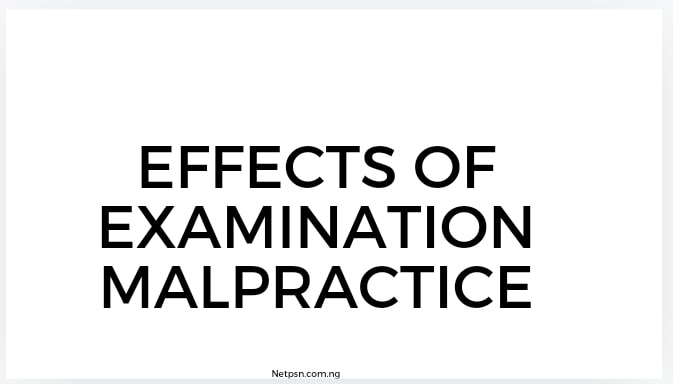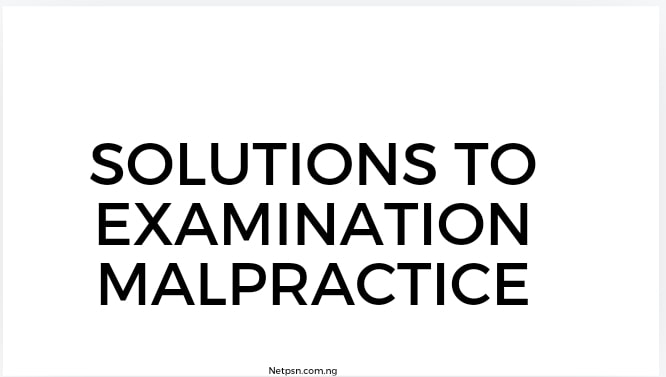Examination malpractice is a pervasive issue that affects educational systems across the globe. While students might engage in it to gain short-term advantages, the long-term repercussions can be detrimental not only to individuals but also to society as a whole. This article will explore the various Effects of Examination Malpractice, shedding light on its far-reaching impact.
What is Examination Malpractice?
Examination malpractice refers to any act of dishonesty or misconduct during exams, including cheating, using unauthorized materials, impersonation, and bribery. It is an unethical practice that undermines the integrity of educational systems and leads to unfair outcomes.
The Immediate Consequences for Students
1. Loss of Academic Integrity
Examination malpractice compromises the value of education. Students who cheat do not gain the knowledge or skills that exams are designed to assess. As a result, they may pass their exams but fail to meet the actual requirements for advancing academically or professionally.
2. Disciplinary Actions
Institutions often impose severe punishments on students caught engaging in examination malpractice. These may include:
- Suspension or expulsion from the school.
- Cancellation of exam results, leading to a significant setback in academic progress.
- Legal implications in some cases where examination malpractice is a criminal offense.
3. Short-Term Success, Long-Term Failure
While students may achieve short-term success through cheating, they often find themselves unprepared for real-world challenges. This lack of preparation can affect their future careers and job performance, leading to long-term failures.
Effects on Educational Institutions
4. Erosion of Trust in the System
One of the most significant effects of examination malpractice is the loss of trust in the educational system. When cheating becomes widespread, the credibility of an institution’s qualifications diminishes. This leads to skepticism from employers, institutions, and society at large regarding the value of degrees and certificates issued by the school.
5. Devaluation of Academic Standards
Examination malpractice devalues the academic standards of an institution. When students pass without earning their grades, it undermines the merit-based system. Over time, the institution’s reputation may suffer, reducing its appeal to prospective students and faculty.
6. Increased Costs for Security and Monitoring
To combat examination malpractice, institutions must invest in stronger security measures, including surveillance, additional invigilators, and strict exam protocols. These measures can be expensive and place additional financial strain on educational institutions.
Long-Term Impacts on Society
7. Reduced Workforce Competence
When individuals engage in examination malpractice and fail to gain the necessary knowledge and skills, it leads to an incompetent workforce. This can have widespread consequences for industries, as professionals may be ill-equipped to handle job responsibilities effectively.
8. Corruption and Unethical Practices
Examination malpractice is often a reflection of broader societal issues, such as corruption. When students are allowed to succeed through dishonest means, it reinforces the idea that unethical practices are acceptable in society. Over time, this mindset can infiltrate various sectors, including business, governance, and law enforcement.
9. Widening Social Inequality
Examination malpractice often benefits students from wealthier backgrounds who can afford to bribe officials or access privileged resources. This exacerbates social inequality, as students from disadvantaged backgrounds may not have the same opportunities to engage in malpractice, leading to unequal access to education and career opportunities.
Psychological and Emotional Consequences
10. Increased Stress and Anxiety
Students who cheat often experience heightened levels of stress and anxiety. The fear of being caught and the guilt associated with dishonesty can take a toll on mental health. Additionally, knowing that their success is not based on merit can lead to low self-esteem and self-doubt.
11. Lack of Personal Development
Examinations are designed to assess not only knowledge but also critical thinking, problem-solving, and time management skills. When students engage in malpractice, they miss out on the opportunity to develop these important life skills, leaving them ill-prepared for future challenges.
Ethical Implications for Educators and Exam Administrators
12. Compromised Professional Ethics
Examination malpractice is not only limited to students; it can involve educators and administrators who are complicit in unethical practices. When teachers and invigilators turn a blind eye or actively participate in malpractice, it compromises their professional integrity and undermines the education system’s ethical foundation.
13. Legal Consequences
In some countries, examination malpractice is a criminal offense that can lead to legal consequences for both students and educators involved. This can result in fines, imprisonment, and permanent damage to one’s career and reputation.
Global Perspective on Examination Malpractice
14. Examination Malpractice in Developing Countries
In many developing countries, examination malpractice is particularly prevalent due to a lack of resources, overcrowded classrooms, and underpaid teachers. This creates an environment where students and educators alike may feel pressured to engage in dishonest practices to achieve success.
15. Efforts to Combat Examination Malpractice
Globally, governments and educational institutions are taking steps to address examination malpractice. This includes implementing stricter exam protocols, investing in technology such as biometrics and surveillance, and promoting a culture of integrity through educational campaigns.
Conclusion
Examination malpractice is a complex issue with far-reaching consequences. It not only affects the individuals involved but also has a profound impact on educational institutions, society, and the workforce. To combat this issue, there must be a collective effort to promote academic integrity, enforce stricter regulations, and create a culture where ethical behavior is valued over short-term success.
Also Read: Solutions to Examination Malpractice
Frequently Asked Questions (FAQs)
1. Why do students engage in examination malpractice?
Students often engage in examination malpractice due to fear of failure, pressure to succeed, lack of preparation, or peer influence. In some cases, systemic issues like poor teaching quality and resource scarcity also contribute to this behavior.
2. What are the legal consequences of examination malpractice?
In many countries, examination malpractice is considered a criminal offense. Legal consequences can include fines, imprisonment, and disqualification from future exams. Institutions may also impose penalties such as expulsion and result cancellation.
3. How can schools prevent examination malpractice?
Schools can prevent examination malpractice by implementing strict exam protocols, investing in technology such as surveillance and biometrics, educating students about the importance of academic integrity, and fostering an environment that encourages ethical behavior.

















+ There are no comments
Add yours